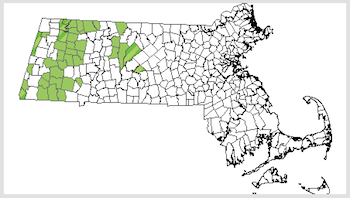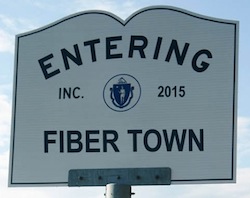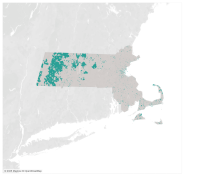Officials from WiredWest Communications Cooperative in western Massachusetts spent years working with small towns creating a collaborative plan to develop a regional fiber network. The deadline for participation was, January 9th, a little more than a month away, and even though the trail had been thorny, the path now seemed clear. Suddenly, the state revoked critical funding, sending the carefully planned and negotiated project into shambles.
WiredWest Coop Born, Reborn, Ready to Ride
More than five years ago, a group of small towns in Western Massachusetts formed a communications cooperative that evolved into the WiredWest Communications Cooperative Corporation. Their goal was similar to that of any cooperative organization: use the collective resources of the member towns to construct a much needed utility - a fiber-to-the-home network (FTTH) - that could address a persistent problem for a group rural communities - the lack of quality Internet access.
The number of participating towns in the coop has fluctuated over the years; 44 towns are currently official members. Its business plan and operating agreement have also changed as member towns come to consensus on what presents the best path for their local needs.
As the coop refined its model, the business plan, and the operating agreement, WiredWest volunteers worked to secure early subscriber commitments from residents and businesses. Each community obtained a certain threshold of commitment in order to join the coop. To date, WiredWest communities have obtained approximately 7,000 early subscribers.
Each town must establish a Municipal Light Plant (MLP), a process consistent with Massachusetts State Law. The MLP is the entity that is responsible for owning and operating a municipal fiber network. WiredWest describes itself as a cooperative of MLPs with delegates from all 44 member towns as decision makers. The coop's business model also requires a series of votes to ensure local accountability before a town can be considered a member of WiredWest:
- 40% of townsfolk have to pledge to take the service and each submit a $49 deposit
- Each town needs to pass a vote by 2/3rds majority to join the coop and commit to funding the venture
- After that, each town is responsible for choosing its own best course of funding (whether municipal bonding or not).
The WiredWest operating agreement requires each member community to commit for a period of 10 years. If member towns decide to then withdraw from the coop, the other member towns will buy them out. According to the agreement, WiredWest will use revenue from the network for operating expenses and, once earnings are at a break-even point, excess revenue will be used to pay the member towns' debt service. The network as a whole will belong to all member towns of the cooperative.
With the roster at 44 and each community seemingly satisfied with the cooperative model, business plan, and operating agreement, cooperative member towns chose January 9th as the deadline to approve the operating agreement.
A Look Back
MBI's 1,200-mile open access network, MassBroadband 123 was completed in 2014. The middle-mile network was funded with American Recovery and Reinvestment Act funding and state funding. The hope was that private providers would then build out the last-mile to subscribers which would connect to MassBroadband 123. When that plan did not come to fruition, the state agreed to supply more funding to jump start local projects in order to get residents and businesses connected.
The local communities needed the funding, but taking the money put them in the position of meeting the needs of a powerful partner - the partner that controlled the much needed funds on which the entire project depended.
In June 2014, the state legislature provided addition funding for rural connectivity in Massachusetts. The Massachusetts Broadband Institute (MBI), the state entity that owns and operates the middle mile MassBroadband123 fiber network, was chosen as steward of $40 million, a large percentage of that funding.

For the past several years MBI has met with WiredWest board members, provided funds for a planning grant, and helped the group develop plans to connect the WiredWest network to MassBroadband123. In April 2015, MBI conditionally promised up to 40% of the funding for the WiredWest project; the funding would cover approximately one-third of the estimated $120 million to deploy the network. Word of the state grants helped build momentum and towns that wavered in the past decided to join the cooperative.
Throughout the talks with MBI, WiredWest representatives continued to meet with local communities to discuss the possibility of joining the coop. For towns that were committed to joining the effort, WiredWest offered advice on how to proceed. Most of the communities needed to form an MLP and all of the towns needed to take the proper steps to fund their share of the network costs.
The 44 member towns of WiredWest intended to split 2/3 of the project’s costs, and the remaining $40 million would have been covered by state and federal grants distributed through MBI. In keeping with state law, when a municipality needs to bond to fund a project, the decision must be taken up at a series of town meetings. The process requires community involvement and takes places over the course of months in Massachusetts. Over 20 towns had already committed to municipal bonding for the funding by the end of 2015.
State Funding: Here One Day, Gone The Next
The plan appeared to be on track. A consulting firm hired by WiredWest to review the business plan reported that it was sound and financially feasible. As local officials prepared to commit to the operating agreement, MBI contacted each of the 44 communities urging them not to sign on. MBI released a statement saying WiredWest would require “fundamental revision in order to succeed as a reliable framework.”
As part of their announcement, MBI stated that it would not release the $40 million in state funds for the project.
MBI also released a more thorough report, written with the help of a consultant, detailing their concerns with the plan. MBI determined the WiredWest plan to be “overly optimistic and perhaps unachievable” in its projections for the network’s expected subscriber base and revenues versus costs. MBI stated that is was concerned with the accuracy of projected take rates due to the percentage of seasonal properties in the region.
 MBI also took issue with the cooperative structure of WiredWest and the fact that individual towns would not exclusively own the infrastructure in their own communities. MBI Director Eric Nakajima told the Daily Hampshire Gazette:
MBI also took issue with the cooperative structure of WiredWest and the fact that individual towns would not exclusively own the infrastructure in their own communities. MBI Director Eric Nakajima told the Daily Hampshire Gazette:
Nakajima said that WiredWest’s operating agreement contradicts a “Last Mile Broadband Policy” approved by MBI’s board in July [2015]. This policy states: “Last Mile local and regional broadband networks, having been constructed entirely through investments by the (state) and local residents, either as property-taxpayers, renters, or broadband subscribers, will be owned by their respective municipalities.”
Local public ownership is certainly the ideal when it comes to FTTH networks but where a town is small, investing in its own network can be impractical. Pooling resources in a regional effort like WiredWest may be the only option for rural communities like those clustered in western Massachusetts.
Ultimately, Nakajima wrote “the current draft of WiredWest’s operating agreement is not compatible with the best interests of the Commonwealth, the towns, or their residents.”
WiredWest immediately scheduled a meeting about the withdrawl of promised funds. A coop chairman commented on the issue of ownership, throwing in a stab at the age-old conflict of state vs. local control:
“The ownership issue has been an ongoing issue, but WiredWest is nothing but the towns,” said Steve Nelson, chairman of WiredWest’s legal committee. “The question is, do the towns own individual little pieces, or can the towns pool their money into a larger, more sustainable network? The towns are putting up almost two-thirds of the money. We shouldn’t be dictated to by a bunch of Boston bureaucrats.”
WiredWest Responds
In response to MBI, about 75 WiredWest officials and town delegates crafted a rebuttal to MBI’s critique and wrote a response to MBI’s more specific breakdown of the business plan. They corrected what they felt were several mischaracterizations of their business plan.
For one, WiredWest’s consultant previously told them their projected overall costs for the network were “conservatively estimated.” In addition, WiredWest rejected MBI’s assertion that the projected take rate for the network is unrealistic. Instead, WiredWest said they expected their take rate to be in the 75 to 85% range, similar to the take rate that the nearby Town of Leverett has reached for its municipal network. While such a rate may seem high for a municipal network that faces competition from an incumbent, where there is no competition it is not so surprising, as in Leverett. WiredWest’s projections suggest this take rate to far exceed the 47% take rate they say is necessary for the network to at least break even.
In the rebuttal, WiredWest also took exception with MBI’s suggestion the 44 member towns will transfer ownership of the network to WiredWest and effectively lose out on the network’s potential profits while still being responsible for the debt obligation for the network. From WiredWest:
“It is misleading to imply that WiredWest...is an entity separate from the towns that would operate the network on their behalf. It is a cooperative of the towns, by the towns and for the towns. WiredWest is nothing but the towns.”
WiredWest further found fault with MBI’s claim that the coop model violated the state policies and regulations making it ineligible for funding. Coop Board Members especially criticized the claim that the coop structure did made the entity ineligible for funding due to MBI's Last Mile Broadband Policy passed around the same time WiredWest was changing its structure. WiredWest representatives felt that they had been excluded from any input into the new policy and that the implementation of such policy directly undermined local control and the will of the towns.
"Git Along, Little Doggie…"
As MBI and the WiredWest communities meet to decide how to proceed, the state agency encounters skepticism, frustration, and local ire.

On December 16th, an MBI scheduled meeting in Greenfield to present the consultant report was filled to capacity. People in the lobby bearing "We Want Wired West" signs had to be turned away so stood outside in angry protest.
At the meeting, MBI's consultant presented a series of slides suggesting that the WiredWest financials omitted a number of necessary expenditures. Jim Drawe, a Cummington resident who developed the cooperative's financial model, took issue with the consultant's analysis and pointed out that the consultants, "don't know us and don't know our region."
Kimberly Longey, an alternate WiredWest delegate from Plainfield, recently wrote to the Daily Hampshire Gazette, describing the need for flexibility from MBI. In small communities like Plainfield, she writes, MBI's solution of a city financed and owned municipal network is not a realistic option. There are only 648 residents and the town operating budget is only $1 million. Plainfield has voted repeatedly to join WiredWest because they do not have the means, financially or otherwise, to build or manage their own network. She writes:
We have more than 25 square miles of township and more than 50 miles of road, most of it dirt...[WiredWest] is a cooperative of some of the smallest, poorest and hardest to wire towns joining with wealthier communities to band together to build a regional network able to serve them all....Towns have the right and responsibility to choose their broadband solution.
My town has chosen WiredWest.
Meetings between MBI and WiredWest are scheduled as the two entities try to move forward to bring better connectivity to the people of western Massachusetts.
WiredWest map and Fibertown image courtesy of WiredWest.
This article written with considerable contributions from Hannah Trostle and Tom Ernste.







